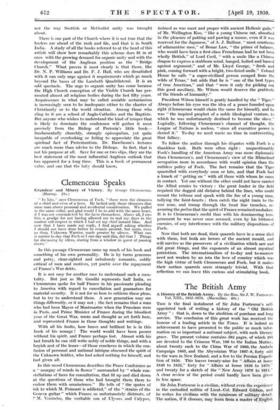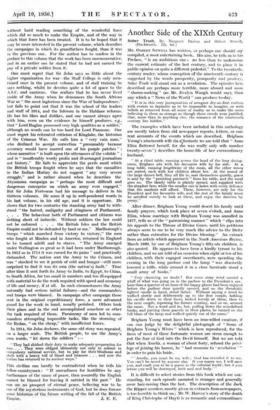The British Army
A History of the British Army. By the Hon. Sir J. W. Fortescue. Vol. XIII., 1852-1870. (Macmillan. 40s.) Tms is the final instalment of Sir John Fortescue's Self- appointed task of writing a history of the "Old British Army " : that is, down to the abolition of purchase and long service. The conclusion of this great work has received the honour of a leading article in the Times. If is indeed an achievement to have presented to the public so much infor- mation on so important a national subject, with such literary grace. The present volume contains 582 pages, of which 204 are devoted to the Crimean War; 166 tothe Indian Mutiny, about twenty each to the China War of 1860, the Ambela Campaign 1863, and the Abyssinian War 1867-8, forty odd to the wars in New Zealand, and a few to the Persian Expedi- tion of 1856. This leaves twenty-nine for "Affairs at home 1840 to 1852," forty for "Affairs at home 1856 to 1879," and twenty for a sketch of the "New Army 1870 to 1914." A clear- review of the period could hardly have been given in less Space.
Sir John Forteseue is a civilian, without even the experience in the embodied militia of Lieut.-Col. Edward Gibbon, and he writes for civilians with the minimum of military detail. The nation, if it Chooses, may learn from a master of English without hard reading something of the wonderful force which did so much to make the Empire, and of the way in which that force has been treated. It is to be hoped that it may be more interested in the present volume, which describes the campaigns in which its grandfathers fought, than it was in the previous one. For the author has to confess in the preface to this volume that the work has been unremunerative, and in an earlier one he stated that he had not earned the pay of a private soldier from it.
One must regret that Sir John says so little about the higher organization for war—the Staff College is only men- tioned once in the present volume, and of staff training he says nothing, whilst he devotes quite a lot of space to the A.S.C. and canteens. One realizes that he has never lived inside of the Army when he denounces the South African War as "the most inglorious since the War of Independence," but fails to point out that it was the school of the leaders
and staff of 1914, and the fulcrum in the Haldane reforms. He has his likes and dislikes, and one cannot always agree with him, even on the evidence he himself produces, e.g.,
that " Lord Raglan possessed very high qualities as a soldier," although no words can be too hard for Lord Panmure. One must regret his reiterated criticism of Kinglake, the historian of the Crimean War. He calls him a "very vain man," who declined to .accept correction "presumably because accuracy would have marred one of his purple patches " ; whose narrative" is built upon the utterances of the voluble " ; and is." insufferably wordy prolix and ill-arranged journalism not history." He fails to appreciate the perils amid which the British troops fought when he says that the casualties in the Indian Mutiny do not suggest "any very severe struggle," and is rather absurd when he describes the Abyssinian campaign as "perhaps the most difficult and dangerous enterprise on which an army ever engaged." But Sir John Forteseue had his message to deliver in his thirteen volumes. He sums it up in well-pondered words in his last volume, in his old age, and it is opportune. He shows that for two centuries the standing army had to with- stand "the hatred, malignity, and stinginess of Parliament.
. . . The behaviour both of Parliament and citizens was nothing short of imbecile. Without soldiers the law could not be enforced . . . the British Isles, and the British Empire could not be defended by land or sea." Marlborough's troops "which marched from victory to victory," the men who fought at Minden and in America, returned to England to be turned adrift and to starve. "The Army emerged under Wellington as great as it had been under Marlborough.
In 1815 as in 1714 it was cursed for its pains" and practically disbanded. The nation sent the Army to the Crimea, and was "shocked to see it perish of cold and hunger—still more surprised to find it was its own (the nation's) fault." . Time after time it sent forth its Army to India, to Egypt, to China, to South Africa, far too small in numbers and too ill-equipped with material to do the work required with speed and economy of life and money, if at all. In such circumstances the Army naturally had serious initial failures—and the commanders and troops were blamed. In campaign after campaign those sent in the original expeditionary force, a mere advanced guard for the work in hand, usually perished. Others took their place. and in the end accomplished somehow or other the task required of them. Parsimony of men led to com- manders attempting impossible tasks, like the storming of the Redan, "on the cheap," with insufficient forces.
In 1914, Sir John declares, the same old story was repeated,- on a larger scale. The British people, to use the Army's own words, " let down the soldiers" :—
"They had shirked their duty to make adequate preparation for war. . . They were obliged, ultimately not only to submit to (lampulsory national service, but to pay for their blindness and sloth with a heavy toll of blood and treasure . . . and now the nation has returned to RS ancient ways."
This civilian can hardly be contradicted when he tells his fellow-countrymen " If tmreadiness for hostilities be any furtherance of the cause of peace, then assuredly the English cannot be blamed for leaving it untried in the past." He can see no prospect of eternal peace, believing war to be one of the mysterious instruments of God, but he does foresee some historian of the_ future writing of the fall of the British











































 Previous page
Previous page